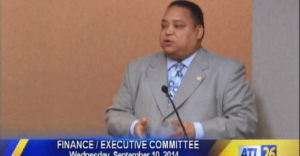Atlanta Passes Resolution for U.S. Constitutional Amendment on Campaign Finance
 (APN) ATLANTA — At the Monday, September 15, 2014, Full Council Meeting, the City Council of Atlanta passed a resolution, 14-R-4121, sponsored by Councilman Michael Julian Bond (Post 1-at-large) expressing the support of the City of Atlanta for a 28th Amendment to the Constitution of the U.S., clarifying that U.S. Congress has the authority to limit campaign contributions.
(APN) ATLANTA — At the Monday, September 15, 2014, Full Council Meeting, the City Council of Atlanta passed a resolution, 14-R-4121, sponsored by Councilman Michael Julian Bond (Post 1-at-large) expressing the support of the City of Atlanta for a 28th Amendment to the Constitution of the U.S., clarifying that U.S. Congress has the authority to limit campaign contributions.
Mayor Kasim Reed failed to sign the legislation, but did not veto it. It passed by operation of law without his signature, according to the Municipal Clerk’s Office.
Atlanta joins several hundred other cities and counties that have passed similar resolutions across the U.S., in response to two recent rulings by the Supreme Court of the U.S.–Citizens United v. Federal Elections Commission (FEC) and McCutcheon v. FEC–that have struck down certain campaign finance limits.
Co-sponsors of the legislation included Ivory Lee Young (District 3), Cleta Winslow (District 4),
Natalyn Archibong (District 5), and Felicia Moore (District 9).
The Council voted twelve to two, with Howard Shook (District 7) and Yolanda Adrean (District 8) voting nay.
Ironically, Councilman Bond did not vote, telling Atlanta Progressive News that he was in the hallway escorting senior citizens whom had just received a proclamation.
At the Finance/Executive Committee Meeting on September 10, there was some debate of the legislation led by Councilman Shook, as Councilman Bond advocated for his legislation from the podium.
“The resolution basically talks about the need for a Constitutional Amendment to the Constitution to clarify two of the recent Supreme Court decisions that have awarded corporations more personhood under the Constitution that infringes upon the general right of free speech to individuals, people like yourselves and around the country,” Bond told the Cmte.
Shook called it a “thought provoking paper,” saying he did research after Bond introduced the resolution. Shook said he was dismayed to learn that two billion dollars was spent on the last Presidential Election, but then realized it was not that much money.
“For Americans to spend two billion on deciding the leader of the free world, maybe is not as out of balance as first meets the eye… During that same time, we spent 40 billion on illegal drugs, 80 billion on unused gift cards, 5 billion on over the counter teeth whiteners, 40 billion for romance novels, 9 billion on tattoos, 8 billion on chewing gum,” Shook said.
“Another premise that sort of bothers me is that money decides elections… but we know that’s not the case… I would be ‘O’ for two in contested campaigns if the person with the most money won,” Shook said.
“I guess more important is my unease at wanting to encourage the government to restrict the timing and content of political speech, which is what this would do, like it or not,” Shook said.
“What this resolution will actually do is provide the support for the effort that is underway in our Congress to finally clarify the point as to whether or not the Congress of the United States has the right to legislatively dictate the types of elections that we have, the types of contributions we have in those elections, and to determine the ability of regular people to have a fair access to those elections,” Bond said.
“As it stands today, that is simply not the case. Even though there was two billion spent on those elections, disproportionate, if you look at the way that money was spent, on the access of the individual versus the access of the corporation or a large union organization that can spend a disproportionate amount of money, compared to regular citizens,” Bond said.
“So as long as money is allowed to be used or defined as free speech, then those with the most money have more speech, those with the most money presumably have more access to the people’s representatives, and that shouldn’t be the case,” Bond said.
Councilwoman Moore said she was supporting the resolution because she thinks that campaign finance should be transparent.
“The new trend, even the more enhanced trend with the Supreme Court ruling, are creating these groups… or PACs of people, where people can funnel unGodly amounts of money into candidates, and you don’t know who those people are and there’s no transparency on that side,” Moore said.
“Now, money can win and money can lose. I had that happen to me in this last campaign. I’m here. So it didn’t work in that instance, but I can see where it can work in other instances,” Moore said.
Susan Brewer, who is working with the Move to Amend national organization, offered public comment at the Committee Meeting.
Brewer circulated a flyer that contained a different version of the proposed amendment, containing additional language not only clarifying Congress’s ability to legislate campaign finance limits, but saying that corporations are not people [even though they are considered such under current case law].
The proposed Constitutional Amendment text adopted by the City of Atlanta is the same, however, as adopted by the City of Savannah.
Chairman Alex Wan (District 6) said he was more comfortable with the Savannah language than the expanded language proposed by the Move to Amend organization.
APN’s News Editor–the present writer–had worked with Councilman Bond to draft the text of the resolution, and after reporting for more than two years on the efforts of Move to Amend, but seeing no progress in Atlanta.
“I’m very pleased that it passed. I’m glad Atlanta has joined the growing pantheon of cities and responsible governments around the country that are taking a stand on this issue,” Bond told APN.
(END/2014)